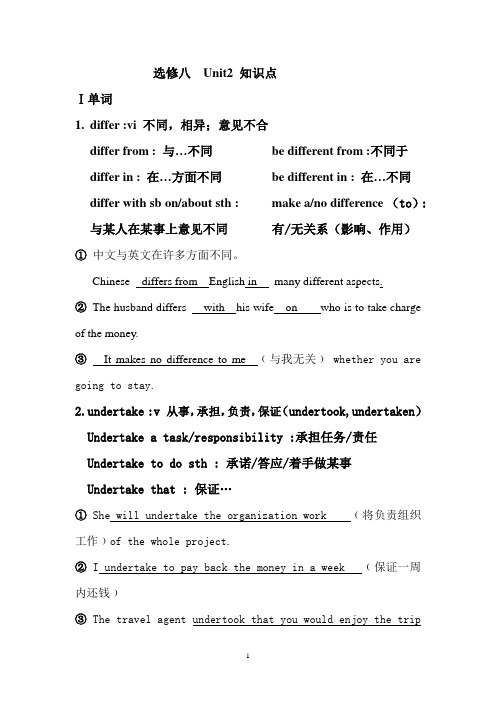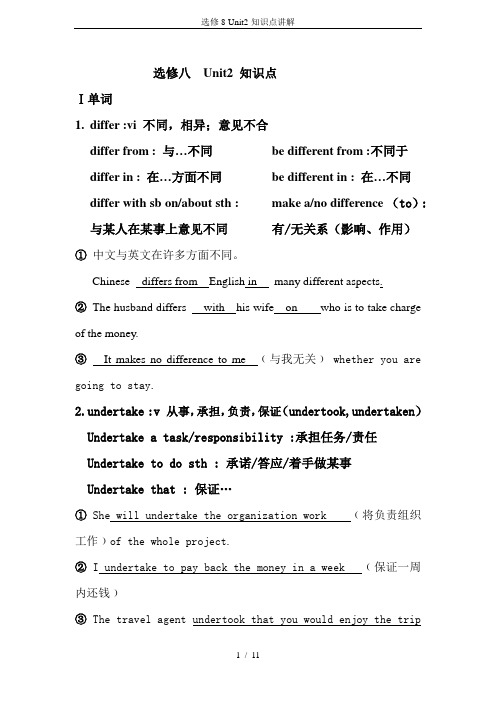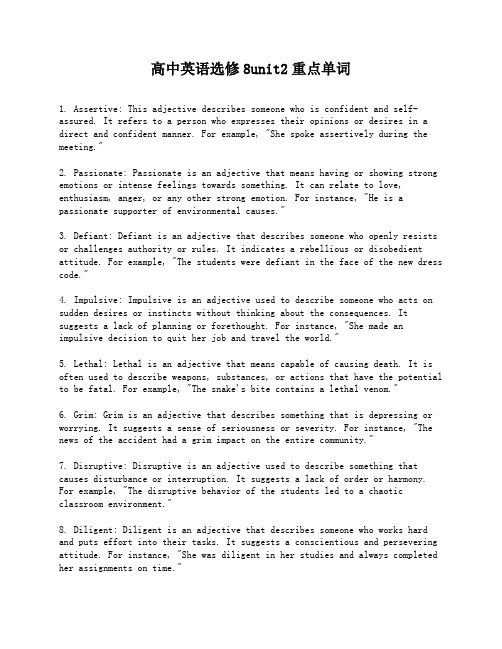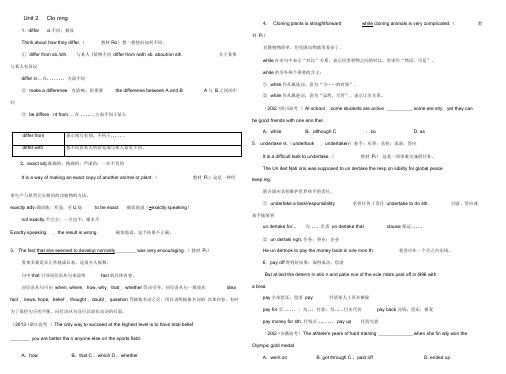选修八unit2知识点汇总
高二|选修8Unit2常考单词、短语、写作句式大放送

高二|选修8Unit2常考单词、短语、写作句式大放送!Unit2CloningⅠ.常考单词必背1.differ vi. 不同;有区别They differ widely in their opinions.他们的意见分歧很大。
[快速闪记]different adj. 不同的;各式各样的;个别的;不平常difference n. 差别,差异2.procedure n. 程序;手续;过程The officer insisted that Michael did not follow the correct procedure in applying for a visa.这位官员坚持认定Michael没有按照正确的程序申请签证。
3.cast vt. 投;扔;掷n.投;掷The fisherman cast his net into the water.渔父把网撒到水里。
The fisherman caught a fish at his first cast.渔父洒下第一网捕到了一条鱼。
He cast an eye at the woman.他向那女人看了一眼。
[快速闪记]cast down 使沮丧4.object vi. 反对;不赞成n. 目的;目标;物体They have recorded all lost objects ranging from potatoes to golf gloves.他们记录了所有丢失的物件,从土豆到高尔夫手套等。
We object to leaving him alone.我们反对留下他一个人。
[快速闪记]objection n. [C]反对;异议;不喜欢objective adj. 客观的5.medium n. (复数:media) 媒介;手段;工具;新闻媒体Advertisers use all kinds of media to sell products.广告商运用各种媒体推销产品。
人教版高中英语选修八第二单元知识点(共29张PPT)

15.Is it in favour of cloning or against cloning?他 赞成还是反对克隆? in favour of 赞成;有利于
The score was 80 to 78 in favour of the
guest team. 比分是80比78,客队获胜。
The exchange rate is in our favour today. 今天的兑换率对我们有利。 短语:in sb’s favor对某人有利 do sb a favor =do a favor for sb帮某人忙 owe sb.a favour欠某人情
He is doing a commercial course at the local college. 他在本地学院学商业课程。
The play was a commercial success. 这出戏从营利角度看很成功。
6. undertake vt. (undertook; undertaken) The procedure is difficult to undertake, of course. The scientist undertakes the experiment. I can undertake the responsibility for the changes. The lawyer undertook a new case. undertake vt 着手做, 实施,从事, 承担
4. It also happens in animals when twins identical in sex and appearance are …
identical adj. ①完全相同的 (常与with / to连用) ②同一的, 同样的
选修8 Unit2 知识点

选修八Unit2 知识点Ⅰ单词1.differ :vi 不同,相异;意见不合differ from : 与…不同differ in : 在…方面不同differ with sb on/about sth :与某人在某事上意见不同be different from :不同于be different in : 在…不同make a/no difference (to): 有/无关系(影响、作用)①中文与英文在许多方面不同。
Chinese differs from English in many different aspects.②The husband differs with his wife on who is to take charge of the money.③It makes no difference to me ﹙与我无关﹚ whether you are going to stay.2.undertake :v 从事,承担,负责,保证(undertook,undertaken)Undertake a task/responsibility :承担任务/责任Undertake to do sth : 承诺/答应/着手做某事Undertake that : 保证…① She will undertake the organization work ﹙将负责组织工作﹚of the whole project.② I undertake to pay back the money in a week﹙保证一周内还钱﹚③ The travel agent undertook that you would enjoy the trip﹙保证你会喜欢这次旅行﹚.3 object :vi 反对;不赞成,抗议N 物体,目标,对象Objection :n 不赞成,反对,异议 Objective :adj 客观的;基于事实的Object to sb/sth :反对,抗议…Object that :抗议…Have an/no objection to (doing) sth : (不)反对…Raise a storm of objections :引起一阵强烈的反对There is no objection to sth :没设么不可以的①犀利哥是同情的对象。
人教版高中英语选修8 unit two

g) 引起 例如:the joke raised a laugh rise 常用于日,月,云雾,烟,水蒸气,气温,物 价,温度,水位,人的职位的上升 arise vi 出现;发生 其主语为抽象名词 例:I am afaid a problem has arisen
8. breakthough n.突破点;冲破;克服;战胜
break through 突破 break away (from sb/sth) 脱离;逃脱;打破 break down 损坏;出故障 break out 爆发 break into 破门而入 break up 打碎;拆散;分解;驱散;结束;衰退 break off 中止;停止;打断;断绝;解除 9. provide sb with sth provide sth for sb 向某人提供某物
知识点:1. differ vi. Differ from…in在…..方面不同 Differ from/with sb on/about/upon sth 关于….不同意某 人。Make a difference between Make no/some difference to sb/sth 对…..没有/有些关 系(影响) 2. In the way 挡道;妨碍 In a way 在某种程度上 On the way/one`s way 在路上 Make one`s way to 排出困难前行 Make way for 为…..让路 The way you said it In which you said it that you said it
3. research n rearch in/into/on 在某一方面的研究
4. be+adj(形容词)+to do 结构(主动的形式)其形 容词有:difficult, hard,easy,comfortable,nice,safe, Impossible,unpleasant,dangerous,convenient等 5.Undertake vt(undertook, undertaken) 承担,担保 Undertake responsibility 承担责任 Undertake a journey 去旅行 Undertake a task 承担任务 Undertake to do sth 答应/同意做某事 Undertake that 从句 保证、担保………
高中英语选修八第二单元知识点

高中英语选修八第二单元知识点高中英语选修八第二单元知识1课内高频词汇1.differ(vi.) 不同;相异→difference(n.) 不同;差异→different(adj.) 不同的2.exact(adj.) 精确的;准确的→exactly(adv.) 精确地;准确地3.undertake(vt.) 着手;从事;承担→undertook(过去式)→undertaken (过去分词)→undertaking (n.) 任务;项目;事业4.regulation(n.) 规则;规章;法规→reg ular(adj.) 规则的;有规律的5.cast(vt.) 扔;投;掷→cast(过去式/过去分词)6.altogether(adv.) 总共;完全地7.object(vi.) 反对;不赞成→objection(n.) 不赞成;反对;异议8.moral(adj.) 道德(上)的;伦理的→morally(adv.) 道德上地;伦理上地9.accumulate(vt. & vi.) 积累;聚积→accumulation(n.) 积累;聚积10.assumption(n.) 假定;设想→assume(vt.) 假定;设想11.shortly(adv.) 立刻;不久12.retire(vi.) 退休;离开→retirement(n.) 退休,退职;退役→retired(adj.) 退休的;离职的13.bother(vt.) 打扰(vi.) 操心(n.) 烦扰14.resist(vt.) 抵抗;对抗→resistance(n.) 抵抗力;反抗→resistant(adj.) 有抵抗力的;耐……的15.obtain(vt.) 获得;赢得→obtainable(adj.) 可获得的;可得到的16.reason(n.) 理由;原因→reasonable(adj.) 合情理的;讲道理的;公道的→unreasonable(adj.) (反义词)不合情理的17.fair(adj.) 公平的;适当的;合理的→fairness(n.)公平→fairly(adv.) 公平地;相当地高中英语选修八第二单元知识2重点短语1.pay_off 得到好结果;取得成功;偿清2.cast_down 沮丧;不愉快3.have_a_great_impact_on 对……有重大影响4.object_to 反对5.in_favor_of 赞成;支持6.owe..._to_ 把……归功于……7.(be)_bound_to_(do) 一定或注定(做)……8.strike...into_one's_heart 使……刻骨铭心9.from_time_to_time 不时;偶尔10.bring...back_to_life 使复生;使复活11.in_vain 白费力气;枉费心机12.in_good/poor_condition 状况很好(坏);情况很好(坏)课内重点句型汇总1.while表对比关系,“然而;可是”Cloning plants is straightforward while(然而)cloning animals is very plicated.2.当now,then位于句首,谓语是e,appear等时,主句完全倒装。
选修8-Unit2-知识点讲解

选修8-Unit2-知识点讲解选修八Unit2 知识点Ⅰ单词1.differ :vi 不同,相异;意见不合differ from : 与…不同differ in : 在…方面不同differ with sb on/about sth :与某人在某事上意见不同be different from :不同于be different in : 在…不同make a/no difference (to): 有/无关系(影响、作用)①中文与英文在许多方面不同。
Chinese differs from English in many different aspects.②The husband differs with his wife on who is to take charge of the money.③It makes no difference to me ﹙与我无关﹚ whether you are going to stay.2.undertake :v 从事,承担,负责,保证(undertook,undertaken)Undertake a task/responsibility :承担任务/责任Undertake to do sth : 承诺/答应/着手做某事Undertake that : 保证…① She will undertake the organization work ﹙将负责组织工作﹚of the whole project.② I undertake to pay back the money in a week﹙保证一周内还钱﹚③ The travel agent undertook that you would enjoy the trip﹙保证你会喜欢这次旅行﹚.3 object :vi 反对;不赞成,抗议N 物体,目标,对象Objection :n 不赞成,反对,异议 Objective :adj 客观的;基于事实的Object to sb/sth :反对,抗议…Object that :抗议…Have an/no objection to (doing) sth : (不)反对…Raise a storm of objections :引起一阵强烈的反对There is no objection to sth :没设么不可以的①犀利哥是同情的对象。
高中英语选修8unit2重点单词

高中英语选修8unit2重点单词1. Assertive: This adjective describes someone who is confident and self-assured. It refers to a person who expresses their opinions or desires in a direct and confident manner. For example, "She spoke assertively during the meeting."2. Passionate: Passionate is an adjective that means having or showing strong emotions or intense feelings towards something. It can relate to love, enthusiasm, anger, or any other strong emotion. For instance, "He is a passionate supporter of environmental causes."3. Defiant: Defiant is an adjective that describes someone who openly resists or challenges authority or rules. It indicates a rebellious or disobedient attitude. For example, "The students were defiant in the face of the new dress code."4. Impulsive: Impulsive is an adjective used to describe someone who acts on sudden desires or instincts without thinking about the consequences. It suggests a lack of planning or forethought. For instance, "She made an impulsive decision to quit her job and travel the world."5. Lethal: Lethal is an adjective that means capable of causing death. It is often used to describe weapons, substances, or actions that have the potential to be fatal. For example, "The snake's bite contains a lethal venom."6. Grim: Grim is an adjective that describes something that is depressing or worrying. It suggests a sense of seriousness or severity. For instance, "The news of the accident had a grim impact on the entire community."7. Disruptive: Disruptive is an adjective used to describe something that causes disturbance or interruption. It suggests a lack of order or harmony. For example, "The disruptive behavior of the students led to a chaotic classroom environment."8. Diligent: Diligent is an adjective that describes someone who works hard and puts effort into their tasks. It suggests a conscientious and persevering attitude. For instance, "She was diligent in her studies and always completed her assignments on time."9. Remorseful: Remorseful is an adjective that describes someone who feels regret or guilt for their actions. It suggests a sense of remorse or repentance. For example, "He was remorseful after realizing the negative impact of his words."10. Candid: Candid is an adjective used to describe someone who is honest and straightforward in expressing their thoughts or opinions. It suggestssincerity and openness. For instance, "She gave a candid response to the interviewer's question."11. Resilient: Resilient is an adjective that describes someone or something that has the ability to recover quickly from difficulties or hardships. It suggests adaptability and strength. For example, "Despite facing numerous challenges, she remained resilient and continued to pursue her goals."12. Inevitable: Inevitable is an adjective that means certain to happen; unavoidable. It suggests that something is bound to occur or cannot be prevented. For instance, "Conflict is inevitable in any relationship."13. Vicious: Vicious is an adjective used to describe something that is cruel or violent. It suggests a destructive or harmful nature. For example, "The dog launched a vicious attack on the intruder."14. Competent: Competent is an adjective that describes someone who has the necessary skills, knowledge, or qualifications to perform a task successfully. It suggests capability and proficiency. For instance, "She is a competent pianist who has won several awards."15. Ruthless: Ruthless is an adjective used to describe someone who shows no pity or compassion. It suggests a lack of mercy or remorse. For example, "The ruthless dictator suppressed any opposition to his rule."16. Efficient: Efficient is an adjective that describes someone or something that is able to achieve a task with the least amount of time, money, or effort wasted. It suggests effectiveness and productivity. For instance, "She managed to complete the project efficiently, meeting all the deadlines."17. Lively: Lively is an adjective that describes something that is full of energy and excitement. It can refer to a place, event, or person that is vibrant and engaging. For example, "The party was lively with music and dancing."18. Adaptable: Adaptable is an adjective that describes someone or something that can easily adjust to new situations or changes. It suggests flexibility and resilience. For instance, "She has an adaptable personality, which allows her to thrive in different environments."19. Reliable: Reliable is an adjective that describes someone or somethingthat can be trusted to perform a task correctly or consistently. It suggests dependability and consistency. For example, "He is a reliable friend who always comes through in times of need."20. Zealous: Zealous is an adjective that describes someone who is very enthusiastic and passionate about a particular cause, activity, or belief. It suggests a strong dedication and commitment. For instance, "She is a zealous advocate for animal rights."21. Respectful: Respectful is an adjective that describes someone who shows polite and courteous behavior towards others. It suggests a sense of honor and consideration. For example, "He was respectful of his elders and always treated them with kindness."22. Unpredictable: Unpredictable is an adjective that describes something that cannot be foreseen or predicted. It suggests the lack of consistency or pattern. For instance, "The weather in this region is often unpredictable, with sudden changes in temperature and rainfall."23. Miserable: Miserable is an adjective that describes a state of great unhappiness, discomfort, or pain. It suggests a low level of satisfaction or well-being. For example, "She felt miserable due to the constant rain and cold weather."24. Generous: Generous is an adjective that describes someone who is willing to give more of their time, money, or resources than is strictly necessary or expected. It suggests a spirit of kindness and selflessness. For instance, "He was generous enough to share his lunch with the homeless man."25. Tenacious: Tenacious is an adjective that describes someone who is very determined and does not give up easily. It suggests a strong will and perseverance. For example, "She was tenacious in her pursuit of success, never letting obstacles deter her."。
选修8unit2词汇讲解

Unit 2 Clo ning1. differ vi.不同;相异Think about how they differ.(教材Ro)想一想他们如何不同。
①differ from sb./sth. 与某人/某物不同differ from /with sb. about/on sth. 关于某事与某人有异议differ in... 在........ 方面不同②make a differenee 有影响,很重要the differenee between A and B A与B之间的不同③be differe nt from ... 在 ...... 方面不同于某人2. exact adj.准确的;精确的;严谨的;一丝不苟的It is a way of making an exact copy of another animal or plant.(教材P ii)这是一种用来生产与原型完全相同的动植物的方法。
exactly adv.确切地;究竟;至U底to be exact 确切地说(=exactly speaking)not exactly 不完全;一点也不;根本不Exactly speaking , the result is wrong. 确切地说,这个结果不正确。
3. The fact that she seemed to develop normally ________ w as very encouraging.(教材P ii)看来多莉是在正常地成长着,这很令人鼓舞。
句中that引导同位语从句来说明fact的具体内容。
同位语从句可由when, where, how, why, that , whether等词引导。
同位语从句一般放在idea , fact , news, hope, belief , thought , doubt , question 等抽象名词之后,用以说明抽象名词的具体内容。
- 1、下载文档前请自行甄别文档内容的完整性,平台不提供额外的编辑、内容补充、找答案等附加服务。
- 2、"仅部分预览"的文档,不可在线预览部分如存在完整性等问题,可反馈申请退款(可完整预览的文档不适用该条件!)。
- 3、如文档侵犯您的权益,请联系客服反馈,我们会尽快为您处理(人工客服工作时间:9:00-18:30)。
Unit 2 Cloning语言要点(模块)Ⅲ.重点词汇(旨在提供词汇综合运用所需材料)1. differ vi. 不同;相异difference n. 不同之处different adj. 不同的[典例]1). Their house differs from mine in having no garage. 他们的房子与我的不同,区别在于他们的没有起车库。
2). The two sides still differ with each other over the question of pay. 双方在报酬的问题上仍各持己见。
[重点用法]A differs fromB in... A与B在……方面不同 A differs with B about/on/over... A与B 就……意见相左2. undertake vt. (undertook; undertaken) 着手;从事;承担;同意,答应,保证(后接to do) [典例]1). She undertook the responsibility for these changes. 她承担了做出这些改变的责任。
2). He undertook to pay the money back in one month. 他答应在一个月之还钱。
3. forbid vt. (forbade or forbad; forbidden) 禁止;不准;阻止妨碍[典例]1). The law forbids the use of chemical fertilizers. 法律禁止使用化学肥料。
2). I forbid you to tell anyone. 我不准你告诉任何人。
[重点用法]forbid sth. / doing sth. 禁止,不许(做某事)forbid sb. to do sth. 禁止某人做某事4. accumulate vt.&vi. 积累;聚积accumulation n [u,c] 积累[典例]1). By investing wisely she accumulated a fortune. 她由於投资精明而积蓄了一笔财产。
2). Dust and dirt soon accumulate if a house is not cleaned regularly. 房屋不经常打扫, 尘土很快就越积越多。
5. owe vt. 欠;应该把……归功于;感激,感恩[典例]1). He owes his father £50. = He owes £50 to his father. 他欠他父亲50英镑。
2). We owe this discovery to Newton. 我们的这一发现归功於牛顿。
[重点用法]owe sb sth = owe sth to sb 欠(某人)债owe sth to sb/sth将某事物归因或归功於某人/事[练习] 根据句子的要求在括号里填入适当的介词。
1). How much do I owe you _______ the groceries?2). He owes his success more _______ luck than _______ ability.3). I owe a lot _______ my wife and children.Keys: 1). for 2). to; to 3). to6. retire vi.退休(役);退出,撤退;就寝[典例]1). He will retire from the army next year. 他明年从部队退役。
2). Our forces retired to prepared positions. 我们的部队撤退到既设阵地上。
[重点用法]retire from... 从……退休(役)/退出retire (from...) (to...) 退下,退出,离开(尤指到僻静处)7. bother vt. 打扰vi. 操心n. 烦扰[典例]1). I am busy; don’ t bother me now. 我很忙,现在别打扰我。
2). I am sorry to bother you, but can you tell me the time. 对不起,打扰了,请问现在几点? [重点用法]bother with/about 一为……而烦恼;因……操心bother to do / doing费神做……[练习] 根据句子的要求在括号里填入适当的词或翻译。
8. obtain vt. (正式;尤指通过努力或计划) 获得;得到obtainable adj能得到的; 可获得的[典例]1). I haven’ t been able to obtain that record anywhere. 我到处都没买到那唱片。
2). He said that the police had obtained this information by illegal means. 他说警方是靠非法手段获得这一资料的。
[重点用法]obtain sth from sb/sth 从……获得某物[练习] 根据句子的要求在括号里填入适当的词。
1). Are his records still ______ (obtain)?2). Further information can be obtained _______ (介词) head office.Keys: 1). obtainable 2). FromⅣ.重点词组(旨在提供综合运用所需材料)1. pay off 得到好结果,取得成功(常用主动态);偿清债款;付清工资解雇[典例]1). At last, his hard work paid off. 最后,他的努力得到了回报。
2). Did your plan pay off? 你的计划成功了吗?[短语归纳] pay短语:pay for付……的钱;为……而付出代价pay back sth. (pay sb. back sth.) 偿还pay sb. (...) for sth. 因某事而付某人…… pay sb. (...) to do sth. 付某人(……)去做某事[练习] 用与pay相关的词组或所给词适当的形式填空。
1). After ten years of hard working she finally _______ _______ her debt.2). Our efforts are sure to ________ ________.3). Her parents ________ ________ America.4). Have you ________ the milkman this week?5). Have you ________ the money _______ the bank yet?6). I will _______ you _______ next week.7). I paid the boy ten yuan _______ (clean) the window.Keys: 1). paid off 2). pay off 3). paid for 4). paid5). paid; to 6). pay; back 7). to clean2. in favor of 赞成;支持;对……有利[典例]1). I am in favor of your suggestion. 我赞成你的提议。
2). I talked to Susan about it, and she’ s all in favor of going. 我与珊谈了这件事,她完全赞同走。
[重点用法]ask a favor请求帮忙 do sb. a favor = do a favor for sb. 帮某人的忙3. be bound to do 一定;注定(做)[典例]1). The weather is bound to get better tomorrow. 明天天气一定会变好。
2). You’ ve done so much work that you're bound to pass the exam. 你下了这麽大工夫, 一定能考及格。
4. be in good/poor/excellent condition 处於好的﹑坏的﹑极佳的状况[典例]1). The ship is not in a condition/is in no condition to make a long voyage. 此船的现状不适宜远航。
2). The car is still in excellent condition. 这小车状况极佳。
[短语归纳] condition 短语:out of condition健康状况欠佳working/living/syudying conditions工作、生活、学习环境on condition (that)... 在……条件下;倘若……on no condition 一点也不; 决不Ⅴ.重点句子(旨在提供句子结构等所需材料)1. The fact that she seemed to develop normally was very encouraging. 她(多莉羊)似乎生长正常的事实很鼓舞人心。
[解释] “that she seemed to develop normally”是一个同位语从句,作the fact的同位语。
同位语从句一般由that引导,常放在fact,truth,news,information,idea,thought,hope,suggestion,advice,reply,remark,report等名词后面,说明该名词的具体容。
当先行词是problem,question或当主句是表示疑问或否定意思时,连接词要用whether或其他的疑问代词或副词。
如:1). The news that he has been elected president of the United States is true. 他当选美国总统的消息是真的。
2). The question whether we should continue to do the experiment has not been answered yet.我们是否该继续实验的问题还没有被解决。
3). I have no idea where the new library will be built. 我不知道新图书馆将要建在哪。
